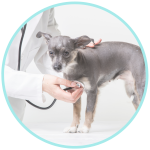





If you observe certain symptoms in your pet, like excessive thirst or urination, jaundice, diarrhea or vomiting, excessive drooling, or a change in behavior, it’s time to consult your vet immediately.
Such symptoms can be because of liver disease or some other hepatobiliary conditions. For liver disease in canines, Ursodiol is one of the best treatments your vet might recommend.
If you’d rather listen to this blog, just click play on the YouTube video below:
What is Ursodiol for dogs? Are there any side effects of it? How many doses of Ursodiol are enough for canines? In this article, we’ll tackle these questions and answer each in detail. So, let’s start.
Top 13 FAQs About Ursodiol for Dogs
As a vet, I often get asked about which medications can and can’t be used for certain conditions. Let’s take a look at the 13 most frequently asked questions about Ursodiol and dogs.



If you’d like to know more about home medications that can help your pet, check out our vet-approved list below.
| Dyne for Dogs: For Energy & Weight Gain | Omeprazole for Dogs: For Ulcers & Inflammation | Enrofloxacin for Dogs: For Bacterial Infections |
Cefpodoxime for Dogs: For Bacterial Infections | Sucralfate for Dogs: Chronic Upset Stomach | Cosequin for Dogs: For Joint Health |
| Ursodiol for Dogs: For Liver & Gallbladder | Trazodone for Dogs: For Anxiety & Aggression | Mometamax for Dogs: For Ear Infections |
| Credelio for Dogs: For Ticks & Fleas | Chlorpheniramine for Dogs: For Allergy-Related Conditions | Butorphanol for Dogs: For Painful Coughs |
| Dinovite for Dogs: For Irritating, Itchy Coat | Dasuquin for Dogs: For Joint Health | Meloxidyl for Dogs: For Pain & Inflammation |
| Glandex for Dogs: For Digestive Support | Rilexine for Dogs: For Bacterial Infections | Enalapril for Dogs: For Cardiac Conditions |
| Quercetin for Dogs: For Allergy & Inflammation | Carprovet for Dogs: For Pain & Inflammation | Pimobendan for Dogs: For Congestive Heart Failure |
| Simplicef for Dogs: For Bacterial Infections | Clindamycin for Dogs: For Bacterial Infections |
Until then, check out our vet’s info on Ursodiol for dogs.
Q: What is Ursodiol for dogs?
A: Ursodiol is a prescription medication that is commonly used in dogs to treat liver disease and gallbladder disease. It is a synthetic form of a naturally occurring bile acid.
Q: How does Ursodiol work in dogs?
A: Ursodiol works by reducing the amount of cholesterol in the bile, which can help to dissolve gallstones and improve liver function.
Q: What types of liver and gallbladder diseases can Ursodiol treat in dogs?
A: Ursodiol can be used to treat a variety of liver and gallbladder diseases in dogs, including chronic hepatitis, cholangitis, and gallstones.
Q: How is Ursodiol administered to dogs?
A: Ursodiol can be administered to dogs as a tablet or capsule, and the dosage and frequency of administration depend on the dog’s weight, age, and condition being treated.
Q: What are the possible side effects of Ursodiol in dogs?
A: Common side effects of ursodiol in dogs may include diarrhea, vomiting, and decreased appetite. In rare cases, it may cause more severe side effects such as liver toxicity or an allergic reaction.
Q: Can Ursodiol be given to pregnant or nursing dogs?
A: Ursodiol should be used with caution in pregnant or nursing dogs, as there is limited information available on its safety in these cases. It is important to consult with a veterinarian before using ursodiol in these situations.
Q: Is Ursodiol safe for all dogs?
A: Ursodiol is generally safe for most dogs when used as directed by a veterinarian. However, it should not be used in dogs with a known hypersensitivity to bile acids or gallstones.
Q: Can Ursodiol be given with other medications?
A: Ursodiol may interact with other medications, such as antacids or cholesterol-lowering drugs, which may reduce its effectiveness. It is important to inform the veterinarian of any other medications the dog is taking before starting ursodiol treatment.
Q: How long does it take for Ursodiol to start working in dogs?
A: The onset of action for ursodiol can vary depending on the dog’s individual response to the medication and the severity of the disease being treated. In general, it may take several weeks to see improvement in the dog’s symptoms.
Q: How should Ursodiol be stored?
A: Ursodiol should be stored at room temperature and kept out of reach of children and pets. The medication should be kept in its original container and away from moisture and light. It is important to dispose of any unused medication properly.
Q: Can I stop Ursodiol suddenly for my dog?
A: It’s better to consult your vet before administering any medication to your pet. Likewise, stopping any drug without discussing it with a vet isn’t a good idea. So, follow your vet’s directions regarding the dosage and timings of drug administration.
Q: Can Ursodiol be given in crushed form to dogs?
A: Crushing the medication makes drug administration in pets easier. Your canines might not like the taste of Ursodiol capsules as they are bitter; therefore, giving this medicine along with food is preferable. Ensure to give enough water along with medication.
Q: Is Ursodiol harmful to the liver?
A: Ursodiol doesn’t cause liver damage. But a liver function test is usually performed before and during the treatment to ensure that your pet doesn’t have any liver problems.



Let’s take a more detailed look at some of the above questions and learn more about Ursodiol for dogs.
What Is Ursodiol for Dogs?
Ursodiol, a naturally occurring bile acid, helps treat liver diseases in canines and cats. However, it is commonly prescribed for dogs with chronic liver disease as it enhances the flow of bile acids.



Consequently, Ursodiol prevents the accumulation of toxic bile acids in a pet’s body, which mostly contributes to liver disease.
What is Ursodiol Used for in Dogs?



Vets recommend Ursodiol for dogs to treat chronic liver inflammation, cholestasis, and gallbladder mucocele. This drug reduces cholesterol uptake as well as the production of cholesterol. In addition, this drug effectively dissolves cholesterol present in gallstones.
Additionally, Ursodiol for dogs is also effective in treating hepatobiliary conditions such as:
- Fatty liver disease
- Acute Hepatitis failure
- Primary portal vein hypoplasia
As this is an “off-label” or “extra-label” drug, you must follow your vet’s directions carefully. That’s because these directions might be different from those on the label.
How is Ursodiol for Dogs Given?
Usually, Ursodiol is administered through the mouth in the form of a tablet, capsule, or liquid suspension. However, you can give it along with food; therefore, you must measure liquid food forms carefully.



Generally, Ursodiol for dogs works within 1 or 2 days after the administration.
Note: This drug is not recommended for rabbits, rodents, or guinea pigs. Also, don’t use Ursodiol along with antacids because of aluminium.
Ursodiol for Dogs Side Effects
Ursodiol is generally well-tolerated by canines. However, some potential side effects may include:
- Diarrhoea
- Upset stomach
- Vomiting
- Tiredness
- Lack of appetite
- Yellowing of eyes, skin, or gums
In rare cases, Ursodiol can worsen liver disease. If you observe any allergic reaction in your pet, like swelling, breathing difficulty, or sneezing, consult your vet immediately.
This drug usually stops working within a day, although its effects can get longer in canines having kidney or liver disease.
Risk Factors of Ursodiol for Dogs
Ursodiol is not recommended for pets allergic to it or other bile acid products. Also, this medication should be used carefully in pets with gallstone complications, including pancreatitis, cholecystitis, or biliary obstruction. Additionally, Ursodiol should be handled carefully in lactating and pregnant canines.
Ursodiol Dose for Dogs



The dose of Ursodiol for dogs is 2.5 to 7 mg per pound of body weight and is usually given twice a day. This medication can be given along with food for effective absorption and reducing the risk of nausea.
If you forget to give a dose to your pet, give the next one as soon as possible. If the time is closer to the next scheduled dose, wait and then go for the next regularly scheduled dose.
Avoid giving a double dose to compensate for a missed one. After administering this medication, wash your hands properly.
Are There Any Drug Interactions That I Should Know About
Let your vet know if your pet is already taking vitamins, herbal remedies, or other medications. They will guide you regarding dosage and administration schedules to prevent potential interaction risks with Ursodiol.
It is found that Ursodiol interacts with antacids, estrogens, and acetaminophen. This drug also adversely interacts with serum bile acid tests and gives faulty results.
Does Ursodiol Need Any Monitoring Before Administration?
Your vet will monitor your canine’s liver function through a liver panel before starting the medication.



Then, this monitoring will be done monthly, after three months, and after six months. A pet monitoring through gallbladder or liver ultrasound is important to ensure that medication works effectively.
Storage and Disposal of Ursodiol for Dogs
It’s better to store Ursodiol in a tightly closed container at room temperature (20 ℃ and 25 ℃/ 68 °F and 77 °F) away from heat, sunlight, and moisture. Avoid storing this medication in the refrigerator or freezer.
If your vet discontinues this treatment, the remaining medication should be properly disposed of in the trash.
Different dosage forms of Ursodiol require different storage conditions. Therefore, ask your pharmacist about the storage requirements or read the label for the details.
Precautions Regarding Ursodiol for Dogs



You should only give this medication to those canines for which it is prescribed. But remember to keep Ursodiol away from other pets and children.
The drug is unsuitable for pets with biliary obstruction, fistula, or other gallstone complications. Ursodiol is best suitable for canines and doesn’t work for guinea pigs, rabbits, or other animals.
What to Do In Case of Emergency?
In the case of overdosing or any adverse reaction to the medication, contact your vet as soon as possible. If your vet is unavailable, follow an emergency facility’s directions to deal with the situation.
Reviews for Ursodiol for Dogs
Ursodiol is a very popular treatment for pups, and their owners seem quite happy with its results. Let’s take a quick look at what some of them are saying.









Ursodiol for Dogs – Final Thoughts from a Vet
Ursodiol for dogs can be a good option if your pet has certain liver or gallbladder conditions. However, it’s always a good idea to check with your vet before use when it comes to any “off-label” medications. This allows you to know proper dosages and gives your vet the ability to monitor a medication’s effectiveness.



Related posts:



Dr Saba Afzal is a clinical veterinarian and a professional content writer. I am determined to disseminate ideas worth spreading to pet owners everywhere around the world. As an experienced veterinarian, I am dedicated to delivering accurate and updated knowledge to pet owners
I have more than five years of experience in content writing on different online platforms, including Fiverr, Upwork, and Guru. My expertise is in Microbiology, Biotechnology, Pets Animal Management and handling, and training. You will find my content truly fascinating, unique, and compatible with the world’s standards. I always write original content without any plagiarism and taking care of any grammatical errors.
I will be happy to address your queries and comments. Contact me here

3 Comments